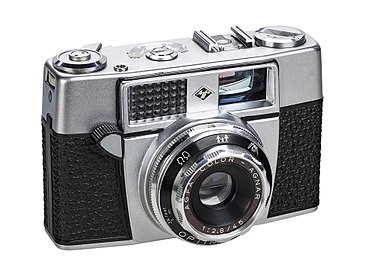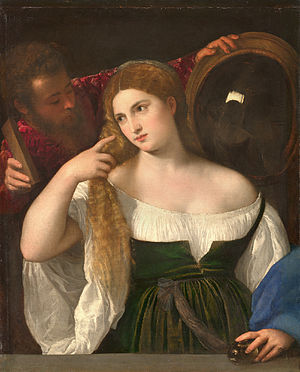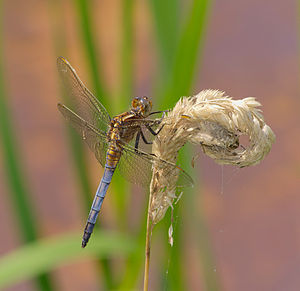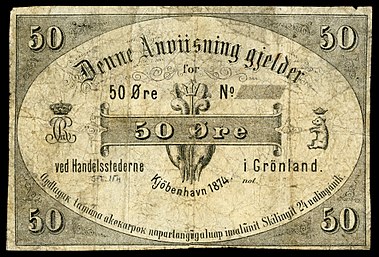Wikipedia:Picture of the day/November 2017
|
Featured picture tools: |
These featured pictures, as scheduled below, appeared as the picture of the day (POTD) on the English Wikipedia's Main Page in November 2017. Individual sections for each day on this page can be linked to with the day number as the anchor name (e.g. [[Wikipedia:Picture of the day/November 2017#1]] for November 1).
You can add an automatically updating POTD template to your user page using {{Pic of the day}} (version with blurb) or {{POTD}} (version without blurb). For instructions on how to make custom POTD layouts, see Wikipedia:Picture of the day.
November 1

|
The Agfa Optima 1a is a camera produced by the German manufacturer Agfa beginning in 1962. One of the first fully automatic 35mm film cameras, it took power required to read the light level for the automatic calculation of aperture and shutter speed from a selenium cell. Photograph: Uwe Aranas
Recently featured:
|
November 2

|
James K. Polk (1795–1849) was the 11th president of the United States, serving from 1845 to 1849. He previously served as the 13th speaker of the House of Representatives and as governor of Tennessee. A protege of Andrew Jackson, Polk was a member of the Democratic Party and an advocate of Jacksonian democracy and manifest destiny. During his presidency, the United States expanded significantly with the annexation of Texas, the Oregon Treaty, and the conclusion of the Mexican–American War. Engraving: Bureau of Engraving and Printing; restoration: Andrew Shiva
Recently featured:
|
November 3

|
Woman with a Mirror is a painting by the Italian artist Titian. This work, dated to c. 1515, depicts an unidentified woman as she primps herself with the assistance of a servant. The painting is now in the Louvre. Painting: Titian
Recently featured:
|
November 4

|
|
A performance of the ballet Don Quixote at the Teresa Carreño Theatre in Venezuela on 18 October 2013. Based on episodes from Miguel de Cervantes' novel Don Quixote, the ballet consists of four acts and eight scenes. It was originally choreographed by Marius Petipa to the music of Ludwig Minkus and first presented by the Bolshoi Ballet of Moscow in 1869. Photograph: The Photographer
Recently featured:
|
November 5

|
Gemini is one of the 88 modern constellations and one of the 12 constellations of the zodiac. Its name is Latin for "twins," and it is associated with the twins Castor and Pollux in Greek mythology. It contains 85 stars visible to the naked eye, with the brightest being Pollux and Castor. Gemini is shown here as depicted in Urania's Mirror, a set of constellation cards published in London in about 1825. Illustration: Sidney Hall; restoration: Adam Cuerden
Recently featured:
|
November 6

|
The Raising of Lazarus is an oil painting on panel by the Dutch artist Rembrandt from early in his career. It was probably painted in the late 1620s or early 1630s. The work depicts the Raising of Lazarus as told in the Gospel of John, Chapter 11. It is in the collection of the Los Angeles County Museum of Art. Painting: Rembrandt
Recently featured:
|
November 7

|
The keeled skimmer (Orthetrum coerulescens) is a species of European dragonfly. It is commonly found in acidic heath land, where it is often seen alongside golden-ringed dragonflies. Photograph: Andreas Eichler
Recently featured:
|
November 8

|
A male saffron finch (Sicalis flaveola), a species of tanager endemic to South America. Although frequently called a canary, the species is not related to the Atlantic canary. When nesting, the saffron finch typically makes use of cavities such as abandoned rufous hornero (Furnarius rufus) nests, bamboo branches, and the underside of house roofs. Males are polygamous, mating with two females during the nesting season. Photograph: Charles J. Sharp
Recently featured:
|
November 9

|
Pampus is an artificial island and late 19th-century sea fort located in the IJmeer near Amsterdam. Together with the artillery battery on the lighthouse island near Durgerdam and the battery at the Diemer seawall, Pampus protected the entrance to IJ Bay and the harbour of Amsterdam. It now belongs to the municipality of Gooise Meren and is open to visitors. Photograph: Johan Bakker
Recently featured:
|
November 10

|
Neil Gaiman (b. 1960) is an English author of short fiction, novels, comic books, graphic novels, audio theatre, and films. His notable works include the comic book series The Sandman and novels Stardust, American Gods, Coraline, and The Graveyard Book. He has won numerous awards, including the Hugo, Nebula, and Bram Stoker awards, as well as the Newbery and Carnegie medals. Photograph: Kyle Cassidy
Recently featured:
|
November 11

|
A 1915 recruitment poster for the British Army, using the spectre of German strategic bombing to tell potential recruits that "It is far better to face the bullets than to be killed at home by a bomb." Between 1915 and 1918, German bombings of Britain—at first using rigid airships but later using aeroplanes—killed more than 1,300 people and injured over 3,000. Concern for the defence against the raids ultimately led to the creation of the Royal Air Force on 1 April 1918. Illustration: Publicity Department, Central Recruiting Depot; restoration: Adam Cuerden
Recently featured:
|
November 12

|
The National Library of Greece is a library situated near the center of Athens that holds material produced in or related to Greece. It was founded by Ioannis Kapodistrias in 1832, and its holdings include 4,500 Greek manuscripts. The building was designed by the Danish architect Theophil Hansen, as part of his "Trilogy" of neo-classical buildings, and was opened in 1903. Photograph: Thomas Wolf
Recently featured:
|
November 13

|
The Danish West Indian daler was the currency of the Danish West Indies between 1849 and 1917, and of the United States Virgin Islands between 1917 and 1934. The coin shown here is a ten-daler gold coin issued in 1904, the only year such coins were minted. Also struck that year were gold coins worth four daler. Photograph: National Numismatic Collection, National Museum of American History
Recently featured:
|
November 14

|
The Salting Madonna is a painting by the Italian Renaissance master Antonello da Messina completed c. 1460–1469. It depicts Mary (the Madonna) holding the Christ Child and wearing an ornate golden crown, held by angels over her head. It is housed in the National Gallery, London. The name refers to George Salting, the collector who donated it to the gallery in 1910. Painting: Antonello da Messina
Recently featured:
|
November 15

|
A collection of sixteen wood samples, from left to right, top to bottom: 1. Pinus sylvestris (Pine) Photograph: Anonimski
Recently featured:
|
November 16

|
|
A panoramic view of the Baturraden mountain resort on the slope of Mount Slamet in Central Java, Indonesia. Named for a legend about star-crossed lovers, a manservant (Batur) and noblewoman (Raden), the site features views of Mount Slamet and the nearby city of Purwokerto. Although marketed for ecotourism, it also features a mini-train, paddleboats, a water slide, and a pool. Photograph: Chris Woodrich
Recently featured:
|
November 17

|
Nakhi women carrying the typical baskets of the region in a public performance at the Jade Dragon Snow Mountain Open Air Theatre in Yunnan, China. The Nakhi are one of the 56 officially recognized Chinese ethnic groups and inhabit the foothills of the Himalayas. Their culture, including their literature and farming practices, is strongly influenced by Dongbaism. Photograph: Uwe Aranas
Recently featured:
|
November 18

|
Summer Evening on Skagen's Southern Beach is a painting completed by Peder Severin Krøyer (1851–1909), one of the most notable members of the Danish artistic community known as the Skagen Painters, in 1893. Considered one of Krøyer's masterpieces, it shows his friend Anna Ancher and his wife Marie walking along the beach. It is now held in the Skagens Museum in Skagen, Denmark. Painting: Peder Severin Krøyer
Recently featured:
|
November 19

|
A dusky lory (Pseudeos fuscata) at Gembira Loka Zoo in Yogyakarta, Indonesia. This species is endemic to New Guinea, where it lives in subtropical or tropical forests below heights of 2,500 metres (8,200 ft). Photograph: Chris Woodrich
Recently featured:
|
November 20

|
Luncheon of the Boating Party was painted by the French impressionist Pierre-Auguste Renoir between 1880 and 1881. It depicts a group of his friends relaxing on a balcony at the Maison Fournaise restaurant beside the Seine River in Chatou, France. Included in the Seventh Impressionist Exhibition in 1882, it was purchased from the artist by Paul Durand-Ruel before being bought after a decade-long pursuit in 1923 by industrialist Duncan Phillips. The painting, now in The Phillips Collection in Washington, D.C., has a richness of form, a fluidity of brush stroke, and a flickering light. Painting: Pierre-Auguste Renoir
Recently featured:
|
November 21
|
A female giant kingfisher (Megaceryle maxima) feeding on a tilapia on Lake Naivasha, Kenya. From left to right, this composite of four images illustrates: 1. the kingfisher returning to its perch with its prey; 2. smashing it against the post to break its spine; 3. holding it; 4. beginning to consume it. Photograph: Charles J. Sharp
Recently featured:
|
November 22

|
|
Rüdesheim am Rhein is a winemaking town in the Rhine Gorge in Hesse, Germany. First mentioned in 1074, it received town rights in 1818. As part of the Rhine Gorge, the town is part of a UNESCO World Heritage Site. Photograph: DXR
Recently featured:
|
November 23

|
The cover of an 1867 vocal score for Jacques Offenbach's opéra comique Robinson Crusoé. The French libretto for this work, which was first staged at the Opéra-Comique on 23 November 1867, was written by Eugène Cormon and Hector-Jonathan Crémieux. Although loosely adapted from the novel Robinson Crusoe by Daniel Defoe, the work owes more to British pantomime. Illustration: A. Jannin; restoration: Adam Cuerden
Recently featured:
|
November 24

|
A bas-relief from Persepolis, the ceremonial capital of the Achaemenid Empire (ca. 550–330 BC) in what is now Iran, depicts a fight between a lion and a bull. This symbol has been interpreted as an expression of Nowruz (the Persian New Year), and has also been interpreted as the spring equinox, where the bull (personifying the Earth) and lion (personifying the Sun) fight eternally, symbolizing their equality. Photograph: Anatoly Terentiev
Recently featured:
|
November 25

|
A series of rock formations, with the Dedo de Deus (God's Finger) peak in the background, at the Serra dos Órgãos National Park in Rio de Janeiro state, Brazil. Established in 1939 as the country's third national park, Serra dos Órgãos National Park contains the Serra dos Órgãos mountain range as well as several water sources. Photograph: Carlos Perez Couto, edit: The Photographer
Recently featured:
|
November 26

|
A daguerreotype portrait of William Sidney Mount (1807–1868), an American artist best known for his genre paintings. Born in Long Island, New York, Mount began his career as a history painter but soon began depicting everyday scenes. Today, the largest collection of Mount's works is held at the Long Island Museum of American Art, History, and Carriages. Photograph: Mathew Brady; restoration: Adam Cuerden
Recently featured:
|
November 27

|
A 1960 Opel Olympia Rekord P1 in original condition. An executive car introduced in August 1957 by Opel as a replacement for the previous year's Opel Olympia Rekord, it was larger than its predecessor and sold very well in West Germany. It was replaced in mid-1960 by the Opel Rekord P2. Photograph: Berthold Werner
Recently featured:
|
November 28

|
The Quarrel of Oberon and Titania is an oil painting on canvas by the Scottish artist Joseph Noel Paton. Painted in 1849, it depicts the scene from William Shakespeare's comedy play A Midsummer Night's Dream, in which the fairy queen Titania and fairy king Oberon quarrel. When exhibited in Edinburgh in 1850, it was declared the "painting of the season". The painting was acquired by the National Galleries of Scotland in 1897, having initially been bought by the Royal Association for Promoting the Fine Arts. Painting: Joseph Noel Paton
Recently featured:
|
November 29

|
A 50-øre (half-krone) note issued in 1874, the first year of issue for the Greenlandic krone, a version of the Danish krone. The uniface note was issued in Denmark for use in Greenland. It depicts the royal monogram of Christian IX of Denmark on the left and a small crowned polar bear on the right; later issues depicted a larger polar bear. Banknote: Handelsstederne i Grønland (courtesy of the National Numismatic Collection, National Museum of American History)
Recently featured:
|
November 30

|
A swan created using modular origami, a paperfolding technique which uses two or more sheets of paper to create a larger and more complex structure than possible with single-piece origami techniques. Each individual sheet of paper is folded into a module, or unit, and then modules are assembled into an integrated flat shape or three-dimensional structure by inserting flaps into pockets created by the folding process. These insertions create tension or friction that holds the model together. Photograph: Jacek Halicki
Recently featured:
|
Picture of the day archives and future dates

